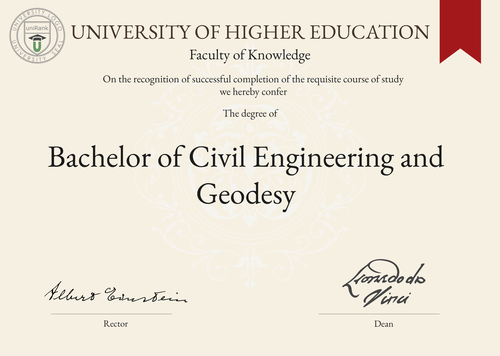
Bachelor of Civil Engineering and Geodesy (BCEG)
Guide to Bachelor of Civil Engineering and Geodesy Program/Course/Degree
Bachelor of Civil Engineering and Geodesy (BCEG)

Program Name:
Bachelor of Civil Engineering and GeodesyProgram or Degree abbreviation:
BCEGDuration range:
The duration of the program typically ranges from 3 to 5 years, depending on the country and university.Tuition range:
The tuition fees for the program can vary significantly based on the country and university chosen for study.Overview:
The Bachelor of Civil Engineering and Geodesy program provides students with a comprehensive understanding of civil engineering principles and geodesy techniques. It equips students with the necessary skills to design, construct and maintain infrastructure projects while considering environmental and societal factors.Curriculum Overview by year:
- Year 1: Introduction to Civil Engineering, Mathematics, Physics, Engineering Graphics - Year 2: Structural Analysis, Geotechnical Engineering, Fluid Mechanics, Surveying - Year 3: Construction Management, Transportation Engineering, Environmental Engineering, Geodesy - Year 4: Structural Design, Geotechnical Design, Project Management, Remote Sensing - Year 5: Advanced Topics in Civil Engineering, Geodesy Applications, Final Year ProjectKey Components:
The key components of the program include theoretical knowledge, practical skills, laboratory work, fieldwork and project-based learning. Students gain expertise in areas such as structural analysis, geotechnical engineering, transportation engineering, construction management and geodesy techniques.Career Prospects:
Graduates of the program can pursue various career paths in the civil engineering and geodesy fields. They can work as civil engineers, geotechnical engineers, structural engineers, transportation engineers, construction managers, surveyors, or geodesy specialists. Employment opportunities exist in government agencies, consulting firms, construction companies, research organizations and academia.Salary Expectations:
The salary expectations for graduates of the program can vary depending on factors such as the country, industry, job position and level of experience. Generally, civil engineers and geodesy professionals earn competitive salaries, with the potential for growth as they gain more experience and expertise. For a more accurate understanding of salary expectations, you can utilize the Job Sites Search Engine, from our sister site jobRank, which searches over 4,600 job sites worldwide. Make sure to specify not only the job title but also the country you are interested in.Conclusions:
It is important to note that the duration, tuition fees, curriculum, key components, career prospects and salary expectations of the Bachelor of Civil Engineering and Geodesy program can vary based on the chosen country or location for study, as well as the chosen university. Prospective students are advised to research and compare different universities and countries to find the best fit for their educational and career goals. Visitors can search for where this specific degree, Bachelor of Civil Engineering and Geodesy, is offered anywhere in the world through the uniRank World Universities Search Engine.World Universities Search Engine
search for Bachelor of Civil Engineering and Geodesy (BCEG) and add the Location (country, state etc.) or specific University you are interested in studying at.
Query examples:
- Bachelor of Civil Engineering and Geodesy (BCEG) United States
- Bachelor of Civil Engineering and Geodesy (BCEG) United Kingdom online
- Bachelor of Civil Engineering and Geodesy (BCEG) Australia international students
- Bachelor of Civil Engineering and Geodesy (BCEG) University of California
- Bachelor of Civil Engineering and Geodesy (BCEG) University of London tuition fees
- Bachelor of Civil Engineering and Geodesy (BCEG) University of Sydney scholarships
Share Program/Course
Interesting? Share this program/course/degree info with your friends now.